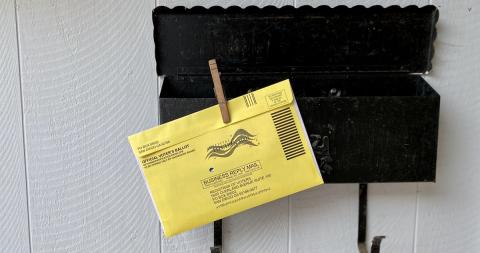Some county registrars lock up equipment and threaten dismissal to protect California’s early votes from being tallied before election day.
The state legislature changed election law this year so election officials could scan ballots as they come in, to deal with an expected crush of ballots well before election day. Officials wanted to be sure the count wouldn’t be slowed by the decision to send each voter a mail ballot because of the pandemic.
Ballots have been coming in at a record pace. As of today, 32 percent of voters already returned their ballots, according to Political Data Inc.’s ballot tracker.
County elections departments are processing the ballots, but not compiling vote totals.
“(U)nder no circumstances may a vote count be accessed or released until 8 p.m. on the day of the election,” the election code states. No one wants to influence the outcome of a race by releasing vote counts before the polls close.
More Election 2020 Coverage Here
Yet once a ballot is scanned, doesn’t a computer take over? Isn’t a vote total in there somewhere? Couldn’t someone take a peek at it?
No, elections officials say. Scanning starts the process but doesn’t total the votes.
“We don’t generate any reports to know what the result is until election night,” said Michael Vu, registrar of voters for San Diego County.
In San Diego County, the vote tabulation system does not connect to the scanner, he said. And the tabulator puts out a total only “when we ask it to,” he said. That’s election night.
Just to make sure there’s no trickery, the tabulator is kept under lock and key in a separate room, he said. Only the few people who must tabulate votes have access and even they must sign in at the door. Vu said he doesn’t even have keycard access to the room. There’s video surveillance of the equipment, too.
Keeping scanning and tabulation systems separate appears to be common in California. Forty of the state’s 58 counties use the same tabulation system as San Diego County, according to a list from the Secretary of State’s office.
Shasta County uses the same system. Counting votes involves two servers, said Cathy Darling Allen, registrar of voters. They are separate. The first server stores data generated by the scanners that read the ballots. The second is a reporting and tabulation server that runs a different program.
“That’s the server we use on election night,” she said. Both are kept in a protected area.
In San Joaquin County, scanners and vote tabulation software are supplied by a different company, but the result is the same: the system scans ballots without tabulating them. Eleven counties use this system.
No one can sneak in, run the numbers and take a peek without getting caught, said Joseph Holland, registrar of voters of Santa Barbara County. “They’d be fired” if they did, he said.
For security, Holland said two people are required to access the tabulator. And whenever anyone accesses the tabulation server, it creates a permanent record called an audit log that cannot be removed from the system.
Finally, the equipment is not connected to the Internet. That’s the law to thwart hackers and prevent tampering.
This coverage is made possible through Votebeat, a nonpartisan reporting project covering local election integrity and voting access. In California, CalMatters is hosting the collaboration with the Fresno Bee, the Long Beach Post and the UC Berkeley Investigative Reporting Project.
CalMatters.org is a nonprofit, nonpartisan media venture explaining California policies and politics.
